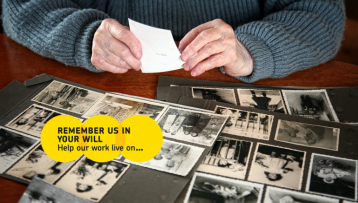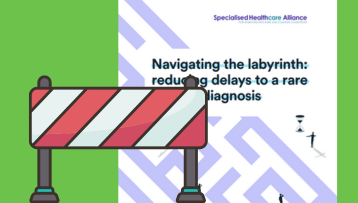As we reach the summer months, many people in the TSC community will be going away on holiday. Like many special occasions, holidays can bring challenges for some children and adults, especially those living with TSC
Whether travelling by car, train or aeroplane, we’ve created a handy guide to help make holidays as enjoyable and stress-free as possible for everyone.
Sorting travel insurance
Travel insurance gives you the opportunity to cover the costs of things like medical bills, having to cancel a trip, or losing an important when on holiday. Depending on the cover you choose, you might be able to claim back some or all of your costs.
Without travel insurance, you might be left with massive costs for things like even basic medical care, or replacing a lost item. This is especially important when travelling abroad. You should always consider getting travel insurance at the same time as booking your holiday, so that you’re covered immediately if anything happens before you go.
We often hear from the TSC community that it can be more difficult to get travel insurance with TSC. You might find it helpful to call an insurer directly to get a quote, as opposed to completing a form online where TSC may not be listed. You might also want to look into specialist insurance providers for pre-existing medical conditions, which might offer broader cover or costs that are slightly cheaper.
UK holidays
If you’re planning a holiday in the UK, you may wish to visit Tourism for All, a charity dedicated to making travel accessible. They provide information about accessible destinations and accommodation throughout the UK.
If you’re considering travelling by rail, you should check station facilities and accessibility before you travel. Contact the train company you’re travelling with for support booking tickets if needed. You may also wish to keep the train company’s contact details with you while you travel in case you have any issues on your journey.
If you find travel on public transport challenging, you could consider the Motability Scheme to pay for the costs of leasing a car. You are eligible for the Motability Scheme if you have had the:
- higher rate mobility component of Disability Living Allowance (DLA) for 12 months or more
- enhanced rate mobility component of Personal Independence Payment (PIP) for 12 months or more
To join the scheme, you’ll need to pay using the components of these benefits. It pays for insurance, breakdown cover and vehicle tax, but it does not pay for fuel.
Overseas holiday
If you’re planning a holiday overseas, you should inform your airline and accommodation provider of any medical circumstances. This ABTA checklist can be helpful to understand the type of information you may need to provide. It might be best to speak to airlines and accommodation providers before you book, just to be sure they can offer any adjustments that you need.
You may want to have a look at the TSC support organisation in the country you’re travelling to, to see if they provide information about TSC in their country’s language. You can find the details of international TSC support organisations on the TSCi website.
Medication and prescriptions
It’s important to order the medication you will need whilst on holiday at least four weeks before you travel, to make sure it all arrives on time.
If you’re going abroad and are unsure whether or not you can take your medication into the country you’re travelling to, you can check online or with your prescriber or TSC clinician. You might need to bring a copy of your prescription and ask your TSC clinician to provide a letter explaining your condition and any medication you are travelling with.
There’s always a small chance that an airline might misplace luggage placed in the plane’s hold, or you might lose a bag when travelling. It can be useful to divide medication across different bags, which will make sure you hopefully have a good amount of medication even if any luggage is lost.
Sunflower lanyard
Some people find it helpful to wear a sunflower lanyard when travelling. This lanyard shows other people that you have a hidden medical condition or disability and you might need support. Some UK and overseas airports can offer people things like speedy boarding and quicker security checks if you’ve got a sunflower lanyard and disability. You can get them for free in some shops, or buy one from the Hidden Disabilities website.
Preparing for change
If you or a loved one finds the disruptions in routine and unfamiliar environments that come with holidays difficult, there are some things you can do to help with this. You may want to consider creating a calendar with lists of activities, such as mealtimes and what you’ll be doing each day. This can also help to keep you organised too!
Remember to plan in down time for relaxation and quiet. This can help you to prepare for changes and stick to a form of routine. To avoid heightened anxiety about an unfamiliar location, you can look at photos of the place you will be staying online. You can even use Google Maps’ street view to walk around the area virtually.
Sun protection
Its important for everyone to protect themselves from the sun, but this is especially true for those with TSC. It’s vital to take extra measures to protect yourself from the sun, such as using suncream (minimum SPF 50), avoiding midday sun and wearing broad-brimmed hats.
Most people put on too little sunscreen. When in doubt, more is always better than less!
If you’re going to a beach or outdoor pool and you or your child struggle with the sensory difficulties of suncream, a pop-up sun protection tent can be a great solution alongside shady spots.
Grants and alternatives
We know that TSC can also have an impact on finances, meaning that a holiday is not financially viable for many people in the TSC community. If the costs of a holiday or break are too much to take on, consider applying for a grant to fund a short break for you and your family, such as the TSA Support Fund. Contact the TSA Support Line for further information on the grants you may be eligible for.
Alternatively, there are also many accessible free days out in the UK to enjoy this summer.
Finally, whether you’re going on holiday or not, it’s important to look after yourself this summer. Sometimes the best plans are those that are the simplest, which might be just being together with loved ones.
It might end up being that your perfect summer break is time in your own home or garden. That is absolutely valid and you can certainly enjoy this as much as going on a trip!
Don’t put pressure on yourself to do it all, and remember ask for support if you need it.








































































































































